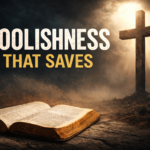
Text: 2 Corinthians 5:1-10; Mark 4
Theme: “We are of good courage”
___________________________
Intr – What type of people are we? Gardeners or carpenters?
I came across these metaphors from an interview with psychologist Alison Gopnik at the University of California, Berkeley, talkin about her book “The Gardener and the Carpenter.” In it, she uses these two metaphors to describe parenting styles. In short, she explains that sometimes parents act like “carpenters” with their children, meticulously planning, executing, and expecting specific outcomes. This approach often leads to unrealistic expectations and unnecessary frustration because it’s impossible to shape a person into exactly what we want them to be. On the other hand, she argues, the “gardener” approach emphasizes nurturing, pruning, watering, and observing, while acknowledging that each season may bring surprises and new developments that were not planned or anticipated. This approach requires adapting to the unexpected.
At the end of the conversation, the interviewer summed it up: “So, if I understood correctly, we need to be less like carpenters—trying to design and execute our children’s future too much—and more like gardeners, being present with unconditional love, care, and attention.”
This metaphor offers an insightful perspective on parenting, especially on Father’s Day. But it is not only for parents; it can be used to illustrate a point for all of us, as we live in the mysterious middle of this world.
1 – The Misterious Middle
I’m talking about something we can draw from Jesus’ parables in the Gospel today. Jesus talks about the Kingdom of God, and by extension, there’s something there about our life here and now. The common thread uniting them is: We know how things started, we know how they end. But about the middle? About the middle – the life here and now – we don’t always know everything. We need to adapt to the unexpected.
In some ways, this is where we are right now. Even though we can anticipate and sort of predict certain things, the fact is that much of what happens we have no clue about. We learn a lot after things happen, not before. Life can be very unpredictable.
2 – Carpenters
This is when anxiety, fear, and lack of motivation may show up. This is where we might get discouraged. And one of the reasons may be our “carpenter” approach to life. Often, we plan and project the details of our lives, or our children’s lives, striving to ensure everything goes perfectly. We believe we already know what’s best for everyone and that we have everything under control. Until we don’t. We forget that if 10-day forecast of rain can be wrong even in the Lower Mainland area, talk about all the other things in life. Unpredictable. Even the “foreseeable future” is not always as foreseeable as we wish it to be.
Here is where conflicts, disappointments, and frustrations on both sides of relationships ensue. Sin, the world, and the devil are terrible enemies. They always bring ways to paralyze us with fear and anxiety about tomorrow or to cause conflicts today. We may lack confidence and courage to carry on. They make us forget that real growth comes from the Gardener—the Lord—and from Him alone.
Therefore, living in this “Mysterious Middle” we need courage. We need encouragement. We need confidence. We need good cheer.
3 – Courage – from the heart
All these meanings above are implied in the verb tharroumen in the epistle today. Also, the root of the word “Courage”, “Cor”, is “heart”. You are people of good courage because the giver of courage dwell in your hearts. The Holy Spirit.[1] He directs us to the Word to find a Word of encouragement, good cheer, and confidence.
In his three parables, Jesus talks about the essence of our courage and confidence to live in this “mysterious middle”: Grace and mystery[2], Small Beginnings, Great Endings[3], Faith and Growth[4]. In summary, these parables from Mark 4:26-34 emphasize the mysterious and gracious nature of God’s Kingdom. Our encouragement resides in the fact that we know who the Gardener is and that nurturing, and growth are 100% guaranteed as we adapt to the unexpected fed by his Word.
In Paul, we see the ultimate reason why we are people of good courage: We live in a temporary tent, awaiting our eternal dwelling.
Illustration: Do you like camping? I like it when it’s an RV… But I think many of you put up a tent in the wild just for the fun and experience. Now, as much as you like camping, do you like your tent more than your house? I guess I know the answer. Camping is good, but it’s provisory. Our house is permanent. Paul utilizes this illustration to point to the fact that our tent in this world, is good; we love life, we love to live. But nothing can compare to our eternal dwelling. This is purpose. This is our ultimate goal.
Here is another way to emphasize the role of this goal in our Christian life. I was listenin g to this video by psychologist Jordan Peterson with an insight more or less as follows[5]: if you are left in the middle of a desert place, the problem you get there is not that you have nowhere to go. It is that you have too many options. That situation is not comfortable for our brain, and anxiousness and fear will increase. When every path is a possibility, then none is. We need goals. Now, when we have a goal that is clear for us, at every step we take towards it, our brain is programed to give us a dump of dopamine(satisfaction) in our blood stream. We feel good. So, according to him, it is almost impossible to have satisfaction, good feelings, without goals.
We Christians already know that. For we have a goal – our eternal home. It is clear, it is guaranteed, and it will certainly come. As we are living here in this tent, in this “mysterious middle” groaning and suffering, as Paul says, not knowing all the time what is coming our way, we have our goal firmly in mind and in the heart. Therefore, every day in this world is one step closer to it. In that sense, at every new day God gives us, if we think we are “Feeling good about doing good”, or about our faith life, being at Church, etc… every day we live in Christ, you know, might bring an actual physical sense to our happiness – dopamine being dumped in our bloodstream. But that is not the most importante. Above all, when know that the joy of the Lord is our strength. The joy of the Lord is our courage, our confidence. We know that there are many ways and opportunities in the World, but we know that only one way leads us to that goal. Our heart has a purpose, our mind has a destination and our life has the fullness of the encouragement that comes from him, as we trust in Him and adapt to the unexpected.
4 – Gardeners
Back to our initial metaphor, it reminded me of the Carpenter of Nazareth. He came to fulfill the carefully planned work of the Father. He obeyed perfectly, planting in the human heart the Father’s unconditional love, extending forgiveness, peace, salvation, and security for life. Guided and cared for by His love, we can grow, venture out, learn, fall, seek forgiveness, and start over, knowing that the Gardener is there to care for each step we take.
In Him we can live less as carpenters and more as gardeners. I am sure we can take good profit from planning, I myself like to do so. But as we are reminded that we are of good faith, we live in the present, we will work as gardeners on nurturing what we have now, leaving the results in God’s hands. That is why we will also put our faith in practice, helping, nurturing, and supporting those around us. Good works are not optional in our life, they must flow from a living faith. This involves a continual striving to align our actions and attitudes with God’s will. A life that is characterized by faith, love, and obedience, driven by our desire to honor God in all things, including adapting to the unexpected.
Gardener parents, gardener people can place their faith and trust in the Carpenter. Jesus Christ offers the seeds of His Word to every heart, providing the only real and secure hope—His love. He gives us the opportunity to be unique and different, both as children and as parents. We can be gardeners who trust the Creator for care and growth. For while planning, dreams, and outcomes can always fail, His unconditional love never does.
5 – When fear lingers
Still, one question may linger: “What if a Christian, living their daily life in faith, still has fears?”
-First of all, Salvation, Forgivness, God’s presence in life are assured to us. So no need to fear here. Perfect love casts our fear (1 John 4)
–This will never change until we die. We are sinners, therefore consequences of sins, such as excessive anxiety and fear will sometimes be present. Being a person of faith and courage means then that you acknowledge your fears, but that you acknowledge someone that is immensely bigger than them. Jesus.
-Excessive anxiety and fear is bad. But some anxiety and some fear may be actually good. For courage lies between fear(that makes us run away) and foolishness (that makes us run into things without considering them). A little fear and evaluation of the situation may go a long way in different situations, especially when we want to avoid getting into paths that take us away from the Lord. And some good anxiety is what we may experience when we live a live in which we eagerly anticipate good things that come from God’s hands, and as we seek to embrace the unpredictable with the confidence in God’s Grace.
Cc – By the way, I’ve been talking about courage all the sermon long but I forgot to ask you a simple question: do you believe courage exists? But how so? Can you prove it? Can you put it under a microscope, provide factual evidence for it? Perhaps the answer would be, “well, as a thing to be seen courage can’t be proven. But you can see it in action, its effects, in many circumstances.”
Remember when people tell you that God doesn’t exist? Or if He does exist, can you provide facts or proof for that? Well, as something for these eyes to see, no. But when you look to His Son’s Work on the Cross, as a historical fact; when you look to His Word, to His Sacrament, to His people in action, to the effects of His presence with us – there you see Him. And if “proof” is something necessary, that is all the proof we need.
For we walk by faith, not by sight.
____________________________
[1] The downpayment Jesus gave us to assure us of our eternal home, the “guarantee” or “pledge” of our future inheritance. The Spirit is given to believers as a foretaste and assurance of the eternal life to come. This indwelling of the Holy Spirit in your heart is a source of strength and comfort, confirming your hope in the promises of God.
[2] This parable highlights the doctrine of grace, where God’s action is monergistic (from Him to us, without our cooperation) and human response is what comes after that. The seed grows “all by itself” (αὐτομάτη), pointing to the idea that faith and growth in God’s Kingdom are gifts from God, not something earned by human merit.
[3] The Kingdom of God starts from small, almost insignificant, but grows into something grand and encompassing. For Lutherans, this resonates with the concept of the hidden and revealed aspects of God’s work. The Gospel, though seemingly small and simple, has profound and far-reaching effects.
[4] Faith, though it may begin small, grows immensely by God’s power. We are justified by God through faith. And the process that starts there, sanctification, is driven by Holy Spirit.
[5] Sometimes we think about ways in which human sciences can help us to understand certain things, or the way in which they confirm things we already know from our faith.
AI picture generated with Runway






